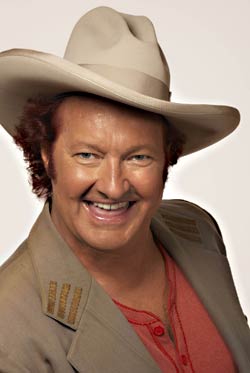My first question for Randy Quaid, star of the cowboy musical Lone Star Love, is a quick shot from the hip: What are you doing in a cowboy musical? There’s a pause on the other end of the phone, then that slow, lumbering drawl: “Well, they sent me the music about three months ago, and then the latest copy of the script, and I liked it.”
From another actor, that answer might sound naive or dismissive. But Quaid’s slow-rolling gravitas makes his answer utterly believable—he liked the script, he’s doing it, it’s that simple. And besides, why not a cowboy musical?
Quaid has had one of the most idiosyncratic careers of any film actor, oafing about in slapstick comedies like the Vacation movies and the Farrelly Brothers’ Kingpin, playing heartbreaking big guys with sweet smiles and small dreams in films like The Last Detail and The Last Picture Show, and winning a Golden Globe for his brilliant and intellectual portrayal of Lyndon Johnson in LBJ: The Early Years. He was a cast member for six years on Saturday Night Live. His most recent theatrical work was in Sam Shepard’s The God of Hell, a performance that had theater critics slavering.
But as much of a Randy Quaid fan as I am, I didn’t know he could sing. Neither, it turns out, did John Haber, the co-writer and producer of Lone Star Love, a Broadway-bound musical adaptation of Shakespeare’s The Merry Wives of Windsor premiering at the 5th Avenue. In fact, it wasn’t until he’d contacted Quaid’s agent about sending the actor a script that he thought to ask if he could sing, and was told yes: He’d recently provided the voice for the Disney animated feature Home on the Range, where he played a yodeling bull. “A yodeling bull,” says Haber. “It was like a sign.”
Quaid is playing Col. John Falstaff, a boisterous con man who arrives in the small town of Windsor, Texas, and outsmarts everybody except the wives of two ranchers who give him his comeuppance. The idea of this burly bear of an actor as Falstaff, Shakespeare’s greatest comic creation, is so richly inspired that I ask him if he’s ever been asked to play the lecherous knight in a straightforward theatrical production. “No, I can’t say anyone’s ever asked. That’s partly why I’m honored they offered this part to me. Any actor suitable for the role would want to play him. His duplicity, his huge ego, and his appetite—for sex, for food—he just wants to take life and devour it.”
Haber describes Lone Star Love as a “traditional musical, where merriment is the operative word,” filled with farce, romance, and comic subplots. While the 5th is presenting its official Broadway premiere, it’s been in development of one sort or another for 19 years at various theaters, and its origin goes back even further, to a production of Merry Wives Haber directed with the Red Clay Ramblers in Chapel Hill, N.C. “We just kept talking about how this should be a full-blown musical, and a lot of years later, here we all are, the Ramblers and me, heading to Broadway.”
Merry Wives is one of Shakespeare’s lesser plays, and might well benefit from a few songs, particularly as provided by the better-than-great Red Clay Ramblers (last seen at the 5th playing for Bill Irwin’s Fool Moon), as well as a transposition to the rootin’ tootin’ Wild West. And Quaid chuckles at the idea of a big musical marquee with “Randy Quaid (He Sings! He Dances!)” up in lights. Then he adds, “I may not be Ethel Merman, but I’m giving Rita Hayworth a run for her money.”








